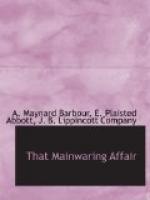“That’s more than I can say, sir, except as I knows the nature of some folks.”
Upon further questioning, the witness stated that on the night of the murder, between the hours of two and three, she was aroused by a sound like the closing of an outside door, but on going to one of the basement windows to listen, she heard nothing further and concluded she had been mistaken.
“Did you see the coachman at that time?” she was asked.
“A few minutes later I looked out again and I see him gaping and grinning at the house and jabbering to himself like an idiot, and I was minded to send him about his business if he hadn’t a-took himself off when he did.”
“He was perfectly sober, was he not?”
“Sober for aught that I know; but, to my thinking, he’s that daft that he’s noways responsible for aught that he says.”
“Were you up-stairs soon after the alarm was given?” asked the coroner, when she had told of hearing from the butler the news of the murder.
“Yes, sir; I went up as soon as ever I heard what had happened.”
“Who was in the library at that time?”
“Nobody but some of the servants, sir. I met Mr. Whitney just as I came out.”
“Did you meet any one else?”
“I met no one, but I saw the housekeeper coming out of her son’s room. She didn’t see me; but she was telling him to get ready quick to go somewheres, and I heard her say to hurry, for every minute was precious.”
Louis Picot, the head cook, could give no information whatever. When the alarm was given, he had rushed, with the other servants, to the scene of the murder, and in his imperfect English, accompanied by expressive French gestures, he tried to convey his horror and grief at the situation, but that was all.
The two maids who attended the English ladies were next called upon; but their testimony was mainly corroborative of that given by the chambermaid, except that Sarah Whitely, Miss Carleton’s maid, stated, in addition, that she had seen Mr. Walter LaGrange leave his mother’s room in great haste and go down-stairs, and a little later, from one of the upper windows, saw him riding away from the stables in the direction of the south gate.
But one servant remained, “Uncle Mose,” as he was familiarly called, the old colored man having charge of the grounds at Fair Oaks. His snow-white hair and bent form gave him a venerable appearance; but he was still active, and the shrewd old face showed both humor and pathos as he proceeded with his story. He had been a slave in his younger days, and still designated his late employer by the old term “mars’r.” He was a well-known character to many present, including Dr. Westlake, who knew that in this instance questions would have to be abandoned and the witness allowed to tell his story in his own way.
“Well, Uncle Mose, you have been employed at Fair Oaks for a long time, haven’t you?”




